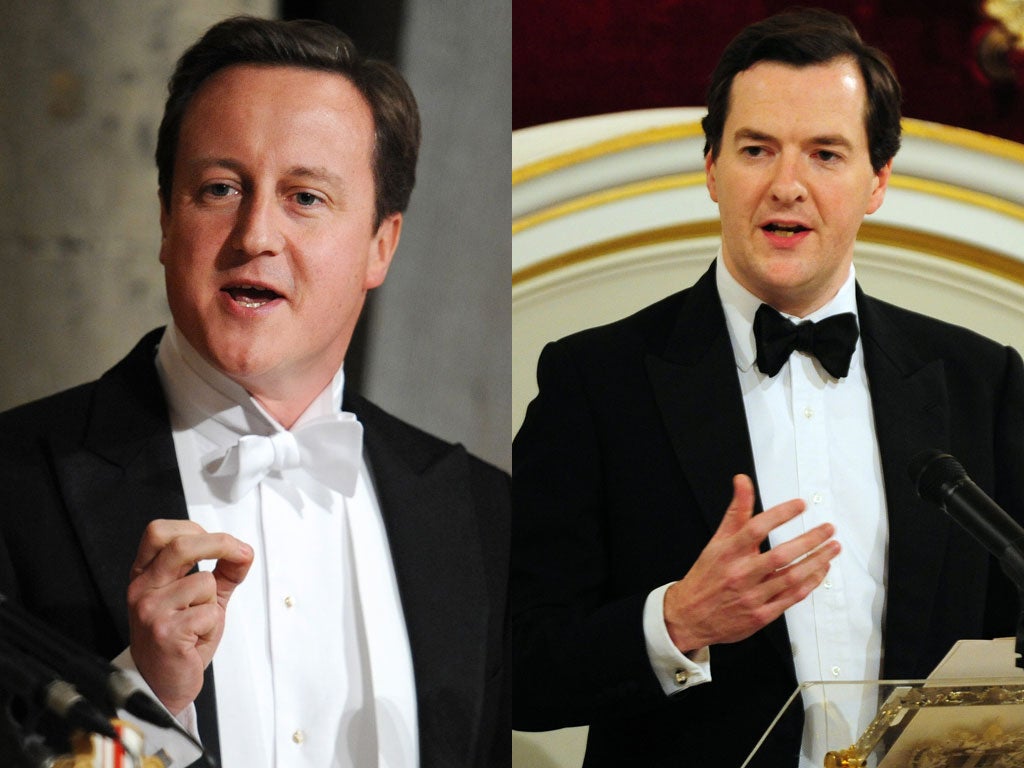Andrew Grice: Budget for the wealthy that exposes Tories’ fatal flaw
Inside Westminster


During the 2010 election campaign, David Cameron had sleepless nights about what he feared might prove the Conservatives' fatal flaw: the public's view that, when it came to the crunch, his party would side with its wealthy friends rather than "people like us".
His fears were not misplaced. Such doubts played a part in the Tories' failure to win an overall majority. Today Mr Cameron looks comfortable in his own skin as Prime Minister. I doubt he is having sleepless nights over this week's Budget. But he should be. It has backfired badly.
The public has bought into the Coalition's central mission of cutting the deficit. But people are unsure whether the Government is living up to Mr Osborne's "we're all in it together" pledge. They want the cuts to be combined with fairness, a big ask but one that should be part of the core mission. Through a combination of bad luck and bad judgment, the Chancellor has undermined the Tories' credentials on "fairness". Reducing the 50p top rate of tax on incomes over £150,000 a year was always going to be a hard sell. The idea was to balance it with two Liberal Democrat demands: a tax cut for those on low and middle incomes, and closing tax loopholes exploited by the rich – a "tycoon tax" under which they would pay a minimum 25 per cent tax on their income and higher stamp duty on homes worth more than £2m.
The bad luck for Mr Osborne was that the Lib Dems were so keen to get some public credit for the "fairness" measures that they talked them up before Wednesday's Budget, so they hardly came as a surprise to the media on the day. The bad judgement by the Chancellor was to think he could freeze the tax allowances enjoyed by pensioners with people barely noticing it.
A year ago the Budget surprise was good news – a bigger-than-expected cut in fuel duty. This year it was bad news; before Mr Osborne had even sat down, the media had dubbed his move on pensioners a "granny tax". It has already caused more trouble than it was worth. Without it, the Chancellor would have had an easier ride over his controversial tax cut for the top 1 per cent. But in the media's mind, and therefore that of the public, a tax cut for the rich is being funded by an attack on pensioners. Bad politics, especially for a party that relies heavily on the grey vote – and the greys do vote.
When Mr Cameron and Mr Osborne jointly addressed Tory backbenchers a few hours after the Budget, they were in confident form and indulged in some joshing, unaware that the next day's headlines would be dominated by the "granny tax". One Tory MP said: "They were a bit too cocky and complacent. It already felt like the morning after the night before. People welcomed the cut in the 50p rate but the raid on pensioners took the gloss off it."
The Chancellor's critics were right. The post-Budget headlines were bad.
A year ago, a YouGov survey found that 44 per cent judged Mr Osborne's second Budget as fair, while 31 per cent disagreed. The verdict on this week's package is very different: 32 per cent believe it is fair and 48 per cent unfair.
The Lib Dems can legitimately claim they had made it a fairer Budget than a Tory one would have been. They stopped the Chancellor cutting the top rate to 40 per cent, joining forces with a nervous Mr Cameron. Mr Osborne had to settle for the 45p I suspect will remain until the election.
The Lib Dems set the agenda in the Budget negotiations. They won a start towards their goal to shift tax away from income and on to wealth, which dates back to John Stuart Mill. "It's been party policy for 150 years," quipped one Clegg aide.
The Lib Dems hope their public lobbying for a big rise in the personal tax allowance will finally mean the voters know it is their policy.
Nick Clegg's negotiating in public, which angered Mr Osborne, was an attempt to break the cycle in which the Tories seem to get the plaudits for the Coalition's good works and the Lib Dems the blame for its nasty medicine.
Mr Osborne has other ideas. He agonised over whether to brand the minimum tax rate a "tycoon tax" because this is how Mr Clegg described it publicly in the run-up to the Budget. The phrase was in and out of the Budget speech as it was finalised. When Mr Clegg saw the final draft, it was missing. He urged Mr Osborne to put it back at the last minute, but the Chancellor refused.
The Lib Dems had distanced themselves from the 50p rate cut and so Mr Osborne did not want them to claim credit for the "tycoon tax", even though it was their idea. "We can't let the Lib Dems look like the good guys and paint us as the nasty party," said one Tory moderniser.
The worry for Mr Cameron and Mr Osborne at the end of a landmark week is that they may have managed to do that all by themselves.

Join our commenting forum
Join thought-provoking conversations, follow other Independent readers and see their replies